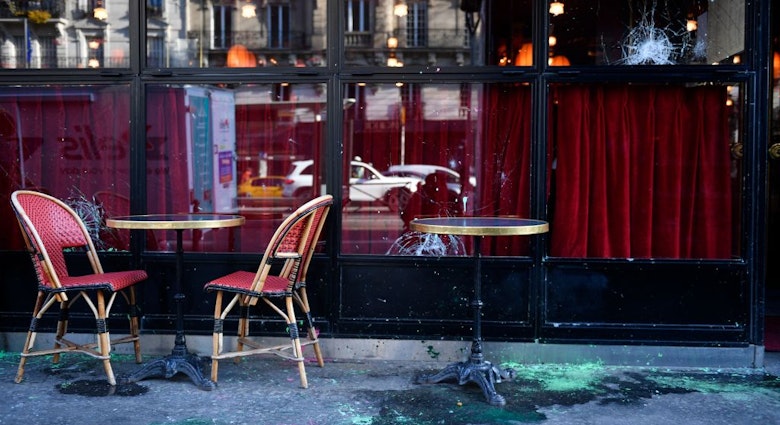
Paris tackles bedbug crisis ahead of Olympics: what to know and how to protect yourself

Oct 3, 2023 • 4 min read

Paris is dealing with a major bed bug invasion ahead of the 2024 Olympics © Shutterstock
Reports of a bedbug outbreak in Paris where I live have been making headlines in France since the summer. But in recent days, the news has generated global interest as the world’s fashion jet-set has descended on the city for Paris Fashion Week. The city and its suburbs are also hosting the Rugby World Cup until the end of the month, and concerns are already being raised ahead of the Paris Olympic games next summer.
Sightings of the pests have been reported on Paris metro lines (the operator RATP says they investigated and found no evidence of bedbugs so far) the London to Paris Eurostar, high-speed TGV trains, several Paris cinemas, and even the Charles de Gaulle Airport’s waiting zone for travelers who have been denied entry into the country.
The infestation of public spaces has mobilized the country’s Transport Minister to convene a meeting with transportation operators this week, and the city of Paris to appeal to the state for a national battle plan against the ‘scourge’ plaguing the city.
“No one is safe. There are risk factors but the reality is you can catch bedbugs anywhere and bring them home,” deputy Paris mayor Emmanuel Grégoire said on French TV.
France’s public health agency estimates that 11 percent of households were infested between 2017-2022,

Since learning of the outbreak hitting public spaces, I myself have developed a new habit of thoroughly inspecting restaurant seats before committing my derrière to a chair and standing in the metro.
Though I’ve hit pause on one of my favorite weekend pastimes, thrifting, previously I was extra careful before touching anything, stored purchases in sealed plastic bags, and washed and dried any new textile purchases at the highest temperature setting as soon as I got home.
I’m not letting the bloodsucking insects prevent me from venturing out but I am being vigilant in order to minimize the risk of bringing them home, and so should visitors.
What you need to know about the outbreak, and how to protect yourself:
First of all, as French health experts point out, there is no established link between a household’s income or cleanliness and the presence of bedbugs. The pests don’t discriminate between the rich and the poor, they’re just after blood. Literally.
Instead, a government report published this past summer cited the rise of international travel, the increasing resistance to insecticides and second-hand shops as the primary culprits to the growing outbreak. In other words, they hitchhike in our luggage and our thrifted purchases.
What do bedbugs look like?
Look out for flat, wingless brown insects the size of an apple seed. Bedbugs don’t jump or fly. The eggs are white and resemble lice.
If you’re staying in an Airbnb or hotel, look out for their droppings. They look like concentrations of small black dots on mattresses, bed frames, and in the corner of walls. Red or dark brown spots could indicate the presence of crushed blood-engorged bugs.
And if you’re waking up to groupings of three to four red, itchy, blotchy patches that look like mosquito bites on your face, arms, legs or back, you may be sleeping in infested quarters.
Bedbugs are adept at hiding in mattresses, sofas, carpets and skirting boards. The blood-sucking insects feast at night and can bite up to 90 times in a single night. But they don’t transmit disease.

What to do (and not do) at your hotel:
Number one rule: never leave your suitcase on the bed or on the floor. Same goes for your clothes. Store your bags on the luggage rack and keep them closed. If your accommodation doesn’t have a luggage rack, place your suitcase in the bathtub or any other hard surface that is elevated off the floor.
Carry out a visual inspection of the room. Pull back the covers and check both the top and underside of the mattress, the headboard, curtains, couches and baseboards for bugs, red or brown blood streaks and droppings.
After your trip:
Same rule applies when you get home: never place luggage on beds, armchairs or sofas.
Unpack in the bathroom and shake out clothing in the shower or bathtub. Examine the contents of your suitcase carefully.
Wash all clothing, whether they were worn or not, in hot water at a minimum of 140F (60C) and dry everything on the highest setting for 30 minutes.
Vacuum the inside and outside of your suitcase and don’t forget to discard the vacuum bag in a tightly sealed plastic bag.
Store the suitcase in the basement or garage, or in a sealed plastic bin, but never under the bed.
Other travel tips:
Hardshell suitcases are preferable over soft ones, where bugs can burrow into the fabric material.
Pack the contents of your luggage in resealable bags and keep them closed during your travels.
Explore related stories

Health & Safety
Protests in Paris: how unrest could impact Easter travel plansMar 31, 2023 • 5 min read



 CyclingHow to plan a biking trip to New Zealand’s Southern Lakes and Central Otago regions
CyclingHow to plan a biking trip to New Zealand’s Southern Lakes and Central Otago regionsNov 11, 2024 • 4 min read
 Solo Travel20 expert solo travel tips for women from the Lonely Planet team
Solo Travel20 expert solo travel tips for women from the Lonely Planet teamOct 31, 2024 • 11 min read




